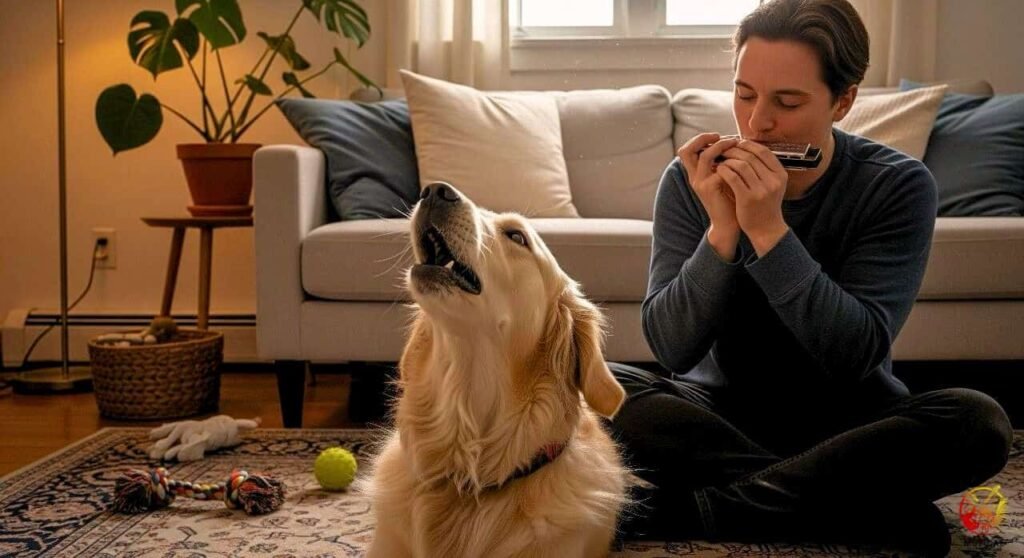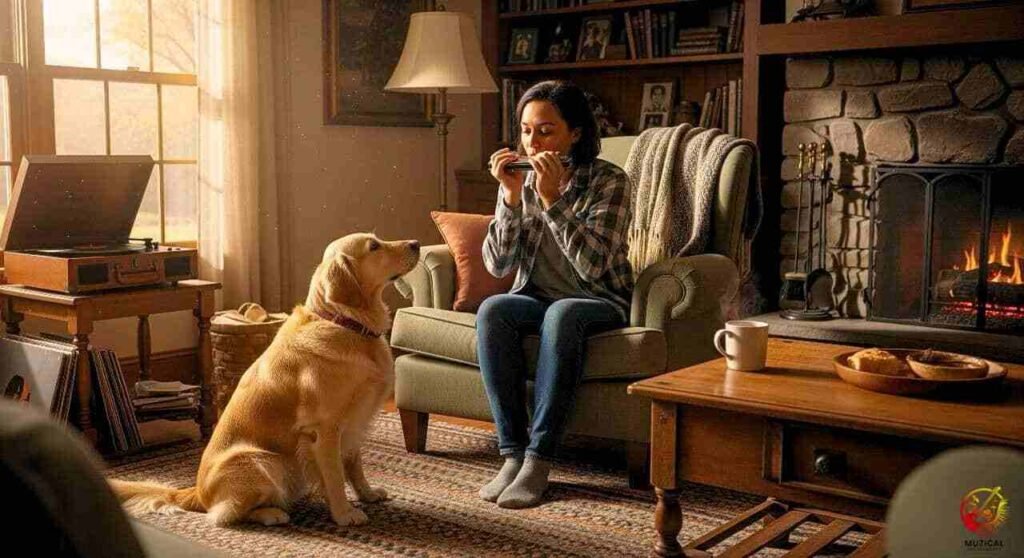Why Dogs Bark at Harmonicas? The Real Reason for The Harmonica Howl
If you’ve ever pulled out a harmonica, you’ve probably seen it: that instant head tilt from your dog, followed by a bark or maybe even a full on howl. It’s one of those funny, weird things our dogs do that makes us ask, why dogs bark at harmonicas?
Let’s be honest, it’s hard to know if you’ve suddenly become a musical genius in their eyes or if you’re accidentally making a sound they just can’t stand.
The truth is, it’s not just a random quirk. There’s a fascinating mix of science and deep seated instinct going on here, from the way their super sensitive ears process the sound to the ancient wolf parts of their brain waking up.
Together, we’ll get to the bottom of it, figure out if that’s a happy howl or a stressed out sigh, and find a way to make your jam sessions enjoyable for everyone in the house.
Is the Harmonica’s Sound Hurting My Dog’s Ears?
This is usually the first worry that pops into an owner’s head. The good news is the harmonica is probably not causing your dog physical pain. The issue is more about how sensitive and different their hearing is compared to ours.

Humans can hear sounds up to a certain pitch, but dogs can hear sounds that are much, much higher, so high that they’re completely silent to us. Think of it like a dog whistle. You can’t hear it, but your dog sure can. A harmonica makes sounds we can both hear, but it also creates very high pitched overtones. These extra sounds give the harmonica its unique wailing quality.
To your dog, these sudden, high sounds can be very strange and startling. It’s not that they hurt, but they are impossible to ignore. Imagine hearing a loud, piercing alarm out of nowhere. You’d jump, right? That’s likely how your dog feels. The sound grabs their full attention, and that surprise or discomfort can lead to barking. It’s a key part of why dogs bark at harmonicas.
| Sound Check: People vs. Pups | Your Hearing | Your Dog’s Hearing | Harmonica’s Sound |
|---|---|---|---|
| Pitch Range (Hertz) | Up to 20,000 Hz | Up to 65,000 Hz | Main notes are low, but creates very high overtones. |
| What It Means | You hear the melody. | They hear the melody plus a lot of extra high-pitched sounds. | The sound is much more complex and intense for a dog. |
Could My Dog Think the Harmonica is Another Animal?
Beyond just the sound quality, let’s think about what the sound means to your dog. Your furry friend’s brain is still wired a lot like its wolf ancestors. For a dog, a strange sound isn’t just noise, it’s a piece of information from the world around them. The harmonica, with its bending notes and wailing sounds, can sound a lot like another animal.

This can trigger two main reactions based on their natural wolf ancestry:
- A Howl from a Strange “Pack”: Howling is how wolves and dogs talk to each other over long distances. It’s their version of a phone call to find friends or warn strangers to stay away. When your dog hears the harmonica, they might think it’s a strange dog howling nearby. Their bark or howl back could be them saying, “Hello, I’m here!” or “Hey, this is my house!” This instinct for pack communication is a powerful driver.
- The Sound of a Hurt Animal: Sometimes, the high-pitched squeal of a harmonica can sound like a small, injured animal’s prey distress call. For dogs with a strong instinct to hunt (like terriers or beagles), this sound can flip a switch. Their barking isn’t out of fear but excitement, as they try to find the source of the sound. This helps explain why dogs bark at harmonicas with such focus and energy.
Pro Tip: Your Mood Matters
Remember, your dog is always watching you. If you’re relaxed and happy while playing, they’ll notice. If you get tense because you expect them to bark, they’ll notice that, too. Your calm energy can help them understand that this strange sound is not a threat.
Why Does My Dog Howl Along and Not Just Bark?
If your dog starts howling when you play, you might have a little musician on your hands! This is often a very different reaction from a sharp, fearful bark. Howling is frequently a social activity. When you play a long, melodic note on your harmonica, your dog might see it as an invitation to a group singalong.
You are the band leader, and they are your loyal backup singer. This behavior is especially common in breeds known for being “talkative,” like Huskies, Malamutes, and Beagles. Their desire to join in is deeply ingrained. They aren’t trying to get you to stop; they are actively trying to be part of the music. This type of canine vocalization is a form of social bonding.
So, is this a good thing? It can be! It’s a moment where you and your pet are connecting through sound. The most important thing is to watch their body language. As long as they seem happy and relaxed, you can enjoy your duet. Understanding this social urge is another piece of the puzzle of why dogs bark at harmonicas.
How Can I Tell if My Dog Likes It or Hates It?

This is the most important skill you can learn. Is your dog’s barking playful or panicked? The answer is all in their dog body language. Learning to spot the difference will tell you everything you need to know. The way they react tells you why dogs bark at harmonicas in your specific home.
A happy or curious dog looks like this:
- Head Tilts: They turn their head from side to side, trying to figure out the sound.
- Relaxed Body: Their muscles are loose, not stiff.
- Ears Forward: They are listening intently, not flattening their ears in fear.
- Tail Wagging: A loose, happy wag.
- Soft Barks or “Boofs”: Playful sounds, not sharp, loud alarms.
A scared or anxious dog looks like this:
- Pacing or Hiding: They can’t settle down or try to leave the room.
- Tucked Tail: Their tail is low or tucked completely between their legs.
- Ears Pinned Back: Flat against their head.
- Licking Lips or Yawning: These are big signs of stress in dogs.
- Stiff Body: Their muscles are tense and rigid.
| Body Language Signal | Happy / Curious Dog | Anxious / Scared Dog |
|---|---|---|
| Looks Like… | Relaxed and wiggly. Ears are forward. Tail is wagging loosely. They might approach you. | Stiff and tense. Ears are pinned back. Tail is tucked. They might try to hide or escape. |
| Sounds Like… | Soft barks, playful “boofs,” or a melodic “singing” howl. | High-pitched, non-stop barking. Whining. |
Why Dogs Bark at Harmonicas and How to Stop It
If you’ve figured out your dog is stressed by the sound, don’t worry. You can help them feel better about it. The goal is to change how they feel, turning the scary harmonica sound into a signal for good things. Animal behaviorists call this counter-conditioning and desensitization, but you can just think of it as “the slow and steady treat game.”
Patience is key. This could take a few days or a few weeks. Go at your dog’s pace.
Step 1: Make the Harmonica a Friend.
Before you even play it, just let your dog see the harmonica. Let them sniff it. Then, place a super yummy treat on it (like a tiny piece of cheese or chicken). Let them eat the treat off the harmonica. Do this a few times until they look happy to see the harmonica because they know it means treats.
Step 2: Play a Tiny Note from Far Away.
Go into another room and close the door. Play one single, very quiet note. The second the sound stops, have someone in the room with your dog give them a treat and say “Good dog!” The sound should be so quiet that they notice it but don’t feel the need to bark.
Step 3: Slowly Get Closer.
Keep your practice sessions short and sweet (just a minute or two). Over many sessions, you can slowly start to play a little louder or for a little longer. Then, try playing from the doorway instead of the other room. If your dog ever starts barking, you’ve moved too fast. Just go back to the last step where they were successful and try again tomorrow. The reason why dogs bark at harmonicas during training is often because we rush this part.
This process helps your dog’s brain build a new connection: Harmonica Sound = Yummy Treat!
Final Thoughts
So, the real story of why dogs bark at harmonicas is a mix of their incredible canine hearing range, their natural instincts, and their unique personality. It could be that the high pitched sound is startling to their sensitive ears, or it might sound like another animal trying to communicate.
For many dogs, it’s even an invitation to a fun group howl with their favorite person. It’s almost never about anger, but about communication and instinct.
Your job is to watch your dog’s body language to understand their true feelings. If they’re stressed, use the “slow and steady treat game” to build a positive association with the music.
By being a patient and observant owner, you can solve the mystery of why dogs bark at harmonicas in your home. You can turn that noise into a non issue, creating a peaceful space where you can play your music and your dog can relax by your side.
While your dog might bark at the sound, you might wonder if playing the harmonica is good for your lungs too.
FAQ: Why Dogs Bark at Harmonicas
1. Does playing the harmonica actually hurt my dog’s ears?
No, it’s highly unlikely that a harmonica played at a normal volume will physically hurt your dog’s ears. The issue is that dogs can hear very high-pitched frequencies that we can’t, and the harmonica’s sound can be startling or strange to them, causing them to react.
2. Is my dog being aggressive when they bark at the harmonica?
It’s very rarely a sign of aggression. The barking is almost always a reaction to a new and confusing sound. They are likely expressing excitement, curiosity, or mild anxiety, not anger. Look at their body language for clues a tense body means stress, while a wiggly body means excitement.
3. Why does my dog howl along with the music instead of just barking?
Howling is often a social instinct. When you play long, melodic notes, your dog might think you are starting a group “sing-along,” and they are joining the pack. It’s their way of bonding and participating with you.
4. Is it okay to let my dog “sing” with me when I play?
If your dog seems happy and relaxed (loose body, wagging tail), then howling along can be a fun bonding activity for both of you. However, if they show any signs of stress, like pacing or a tucked tail, it’s best to stop and work on making them more comfortable with the sound instead.
5. How can I get my dog to stop barking at the harmonica quickly?
While there’s no instant fix, the fastest method is positive association. Start by giving your dog a high-value treat for just looking at the harmonica. Then, play a single, quiet note from another room and have someone reward them immediately. The key is to slowly teach them that the harmonica’s sound predicts something great, like a delicious snack.




